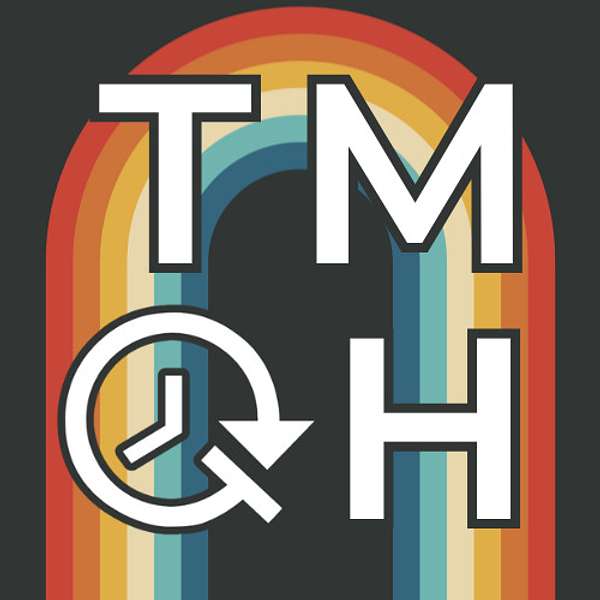
This Month in Queer History
Sharing LGBTQ history that is accessible and entertaining!
This Month in Queer History
Lesbian Avengers: Fire-Eating Feminists
In 1992, sick of lesbian erasure and rampant homophobia, the Lesbian Avengers formed to make lesbian voices heard - even if it meant storming the streets and eating fire at their protests.
Show Notes:
https://www.mybib.com/b/NaMPO1
Follow CAMP Rehoboth:
fb.com/camprehobothcommunitycenter
camprehoboth.org
instagram.com/camprehoboth
On September 9th, 1992, the Lesbian Avengers held their first ever action in New York City - a protest against a local right wing group which attempted to suppress a multicultural “Children of the Rainbow” curriculum in local elementary schools. Having actively recruited for weeks beforehand with flyers handed out at all the local lesbian spots around town, organizers Ana Maria Simo, Anne Maguire, Anne-Christine D'Adesky, Marie Honan, Maxine Wolfe, and Sarah Schulman managed to corral a group of around 50 lesbians. This assembly of Avengers walked through the streets carrying signs that said, “Ask About Lesbian Lives” and wearing t-shirts that read, “I was a lesbian child.” They also handed out lavender balloons to onlookers who gathered from around the neighborhood after hearing the marching band that was following the protesters. This march exemplified the approach of the Lesbian Avengers: take up space, make some noise, generate some headlines, and disrupt the peace in the name of pushing forward lesbian rights.
Soon after, in 1993, they stormed the state capitol building in Austin, Texas, to protest sodomy laws. Their flashiest action, however, came a couple months later in Florida, when Lesbian Avengers from chapters around the country traveled down to Tampa to rally in memory of two queer people, a lesbian and a gay man named Hattie Mae Cohens and Brian Mock, who had lost their lives to a hate motivated fire bombing attack. In a demonstration which would soon become the most recognizable part of an Avengers rally, the protesters ate fire, chanting: "The fire will not consume us. We take it and make it our own.” This fire eating performance symbolized the overcoming of the hate which generated that attack - proof positive that rather than being consumed by the fire, the Avengers would consume that fire themselves.
The Avengers would continue to stage protests, including spontaneous ones, across the US. Between 1993 and 1996, they rented a plane and flew a banner reading “Lesbian Avengers are here!” over the Michigan State homecoming football game, publicly roasted hot dogs to call attention to domestic violence, and dumped a 3-ft pile of horse manure near a Baptist Church marquee that read, “Don't be deceived: homosexuals commit the most heinous crimes in America.” Their penchant for grabbing media attention and their theatrics like fire-eating made them one of the most visible lesbian groups in the 1990s.
Their longest surviving, and likely most recognizable action, is one that happens every year: the International Dyke March. According to co-founder Sarah Schulman, "It was at the 1993 March on Washington that the Avengers and ACT-UP Women's Network created the first Dyke March -- with 20,000 women, marching together with no permit. These participants brought the marches home to their cities and countries and created a new tradition." The organizers stressed that these marches were a protest, not a parade. The Dyke March traditionally occurs without permits, with organizer Kelly Cogswell saying during the 1994 International Dyke March, "We ask for a permit; they can say no." These days, the Dyke Marches usually occur the day before or alongside Pride parades in June on the anniversary of the Stonewall riots, often led by leather clad lesbians on motorcycles.The Dyke March soon spread from New York City to parades across the country, and, eventually, across the globe.
As seen with the Dyke March, The Lesbian Avengers didn't always act alone. One notable collaboration the Avengers did was with Camp Trans, a contingent of transgender protesters who were picketing the Michigan Women's Music Fest, or Michfest as it was often known. Michfest was a festival “by womyn for womyn” which had controversially been enforcing a no transgender attendee or performer policy, despite overwhelming support of trans women's involvement by the Michfest attendees. In 1999, Camp Trans, led by notable activists like Leslie Feinberg, confronted the organizers of Michfest, and they were pretty confident that year - likely because they were flanked by the Lesbian Avengers, who had joined them to act as protective bodyguards. This was just in case things got out of hand, like they did when Camp Trans protested for the first time in 1994, and one of the Michfest organizers threatened to stab one of the peaceful protesters. Thankfully, no such threats happened that year and the group was allowed entrance into Michfest to the applause of fellow attendees.
The Lesbian Avengers saw their heyday in the 90s, and soon their actions became less frequent, with multiple chapters disbanding over the next two decades. That being said, they're definitely still around. If you search hard enough, you might even find a chapter still active in the US not too far from you. And, if you feel so moved by the actions of The Lesbian Avengers, it's not too late to start a new chapter yourself.
Thank you so much for tuning in to the first episode of the second season of this month in queer history. Tune in for our second episode about the history of coming out day.